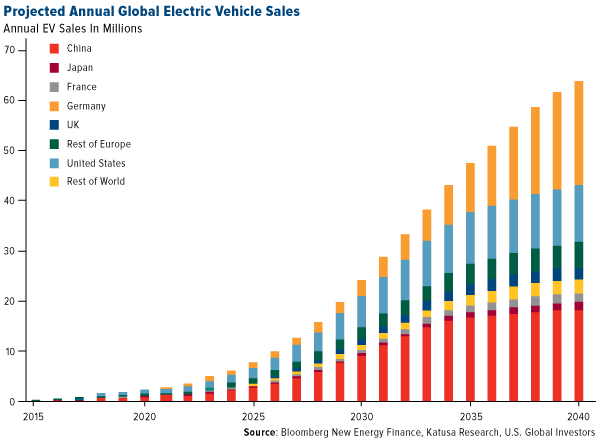Chinese automakers are moving fast to meet the demand. Volvo Cars, owned outright by Hangzhou, China-based Geely Auto, has already stated it will cease production of fossil fuel-powered vehicles by 2020. On top of that, the company is currently building electric versions of London’s iconic taxis, and Uber is rumored to buy as many as 24,000 electric Volvos.
In October, Great Wall Motors announced its plans to form a joint venture with Germany’s BMW to begin production on a new fleet of EVs. Toward that end, the manufacturer bought a 3.5 percent stake in an Australian lithium-mining company to support long-term development of battery resources and control pricing power.
And although it’s not as big a powerhouse as its peers, relative newcomer Guangzhou Automobile Group also has high ambitions to introduce EVs in as many as 14 global markets including North America, Africa, South and Eastern Europe and South East Asia. It recently signed an agreement with tech behemoth Tencent to cooperate on artificial intelligence (AI)-driving and “smart” vehicles.
Looking ahead to 2040, China is forecast to capture more than 40 percent of the world EV market, according to a recent report from the
Earlier this month, I shared with you a quote from Arnoud Balhuizen, chief commercial officer of BHP Billiton, the largest mining company in the world. In a September interview with Reuters, Balhuizen called 2017 the “revolution year [for electric vehicles], and copper is the metal of the future.”
Balhuizen’s assessment couldn’t be more accurate, and the implications for investors is too compelling to ignore.
In the third quarter, global sales of electric vehicles (EVs) soared 63 percent compared to the same period last year, 23 percent compared to the second quarter. A total of 287,000 units were reportedly sold in the September quarter, leading Bloomberg New Energy Finance to project total annual sales to exceed 1 million units for the first time.
As the world’s largest auto market, China was responsible for about half of the sales as the crackdown on polluting industries has propelled renewable alternatives from power generation to consumer products.
60 Million Electric Cars by 2040?
This is only the beginning. The chart below, highlighted by Katusa Research and originally provided by Bloomberg New Energy Finance, takes a look at annual global EV sales forecasts through the year 2040. As you can see, China, the U.S. and Germany will push the adoption of EVs forward, with the rest of the world following closely behind. Many analysts believe that by 2040, the global EV market could exceed 60 million vehicles sold per year.
click to enlarge
Chinese automakers are moving fast to meet the demand. Volvo Cars, owned outright by Hangzhou, China-based Geely Auto, has already stated it will cease production of fossil fuel-powered vehicles by 2020. On top of that, the company is currently building electric versions of London’s iconic taxis, and Uber is rumored to buy as many as 24,000 electric Volvos.
In October, Great Wall Motors announced its plans to form a joint venture with Germany’s BMW to begin production on a new fleet of EVs. Toward that end, the manufacturer bought a 3.5 percent stake in an Australian lithium-mining company to support long-term development of battery resources and control pricing power.
And although it’s not as big a powerhouse as its peers, relative newcomer Guangzhou Automobile Group also has high ambitions to introduce EVs in as many as 14 global markets including North America, Africa, South and Eastern Europe and South East Asia. It recently signed an agreement with tech behemoth Tencent to cooperate on artificial intelligence (AI)-driving and “smart” vehicles.
click to enlarge
Looking ahead to 2040, China is forecast to capture more than 40 percent of the world EV market, according to a recent report from the International Energy Agency (IEA), as well as nearly 30 percent of total new wind, solar and nuclear capacity additions.
click to enlarge
As for the European market, Germany is expected to outpace its neighbors in adopting EVs as Volkswagen, the world’s number one automaker by sales, seeks to become a global leader in electric and self-driving cars. The Wolfsburg-based company announced plans to …read more
Source:: Frank Talk
The post Move Over, Tesla – China Holds the Keys to Electric Vehicles appeared first on Junior Mining Analyst.

